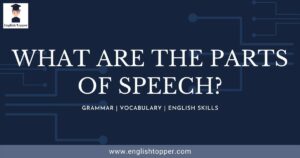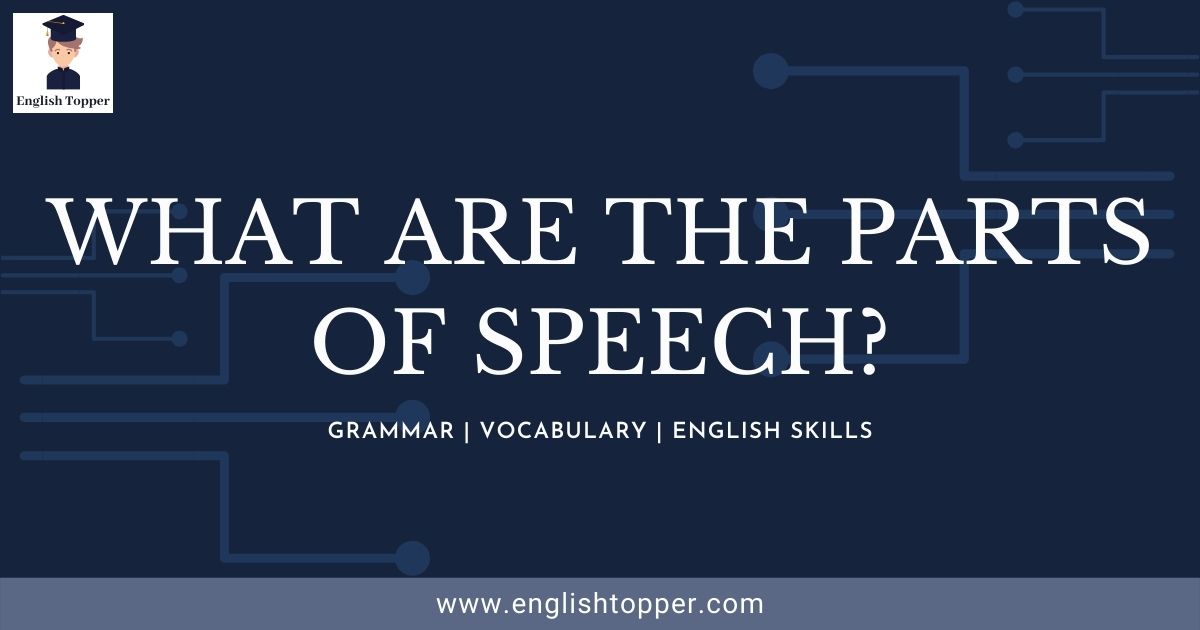Table of Contents
What are the Parts of Speech?
The Parts of Speech is a part of grammar which plays an important role in understanding the structure of words in the sentences.
It helps you arrange the words in a proper manner so that it delivers a proper message.
Usually, in many languages, there are different functions of words in the sentences. Some words take the reference of others depending on the usage.
By learning the Parts of Speech, you will be able to determine the correct meaning of the word with the help of a dictionary.
So in order to learn this, we need to understand 8 different Parts of Speech of the English Language.
Also Read: What is Grammar? | (Grammar definition, types & examples)
What are the eight Parts of Speech?
The eight different parts of speech are given below,
Noun
Here, Noun is simply the name of the person, place, thing, emotion, idea, etc.
The best examples of nouns are John, Henry, Micheal, London, US, Brazil, Eagle, Ant, Fox, Table, Books, Happiness, Joy, etc.
Pronoun
A Pronoun is a word which replaces the Noun in the sentences. The best examples of Pronoun is he, she, it, we, they, etc.
Instead of saying,
Sentence: “John is a good boy. John studies well. John loves to play football”.
We can write it as,
Correct Sentence: “John is a good boy. He studies well and loves to play football”.
Here, we can observe that the word (Subject/noun) is been replaced by the Pronoun word “he”.
It is usually recommended to use Pronoun instead of repeating the noun for every sentence
Tip: It is usually recommended to use Pronoun instead of repeating the noun for every sentence. So only use Noun for the first time only, then, later on, use Pronoun.
Note: Also remember that you can also start the sentence with Pronoun and continue using it for every sentence.
Adjective
An adjective is used to describe or modify the noun in the sentences. For example, consider the below example statement. The adjective is coloured blue for the reference.
Example Statement:
- Shyam wants to purchase a sports car.
Here, "car" is the noun in the above statement and "sports" is used to describe the type of car. So, here the adjective (sports) is describing the noun (car).- John owns a big mansion.
Here the word "big" is used to describe the size of the "mansion" (which is a noun).- Tina liked her pink dress very much.
Here, "pink" is used to describe the colour of the dress.Verb
Verb express the action or state of being. In other words, it represents the action words.
For example, running, singing, dancing, jogging, talking, sing, walk, etc.
Example Statements:
- An angry teacher shouted at a student for his misbehaviour in the class.
Here, "shouting" is the action done by the teacher.- I am feeling very happy today!
Here, "feeling" describes the state of being.Adverb
Adverb describes and modifies the verb in the sentences.
The blue colour words represents Adverb in the below example statements.
Example Statements:
- Why are you talking slowly?
Here, the adverb "slowly" is describing about the action "talking" in the above sentence.- A street dog suddenly started barking at me!
Here, the word "suddenly" (adverb) is describing the action of the verb "barking".Preposition
A preposition is a word which links to another word in the sentence. It is placed before a noun and pronoun.
Some of the examples are on, under, over, of, until, from, etc. Now let us see the usage of the prepostion in the sentences.
Here, Red coloured words are Noun and Blue coloured words are Preposition.
Example Statements:
- The book is on the table.
Here, the two nouns of the above sentence (i.e, book and table) are linked with the prepostion "on".- My school is near my house.
Here, the preposition "near" linked the above two nouns.- The cat is under the tree.
Here, the word "under" is used to link between the nouns.Conjunction
The conjunction is used to join the words, phrases or clauses. Some of the examples are and, or, not, but, etc.
Example Statements:
- Normal Sentence: Micheal attended today’s party. John also attended today’s party.
- Conjunction Sentence: Micheal and John attended today’s party.
- Normal Sentence: Tina went to school. She submitted her assignment.
- Conjunction Sentence: Tina went to school and submitted her assignment.
- Normal Sentence: John is a good boy. He is very kind.
- Conjunction Sentence: John is a good boy because he is very kind.
Interjection
The statements which are used for expressing emotions are known as Interjection.
Example Statements:
- Oh, what a sudden surprise!
- Oh my god, what have you done!
- Woah, which place is this?
Parts of Speech Quiz (Test your knowledge here!)
#1. Identify the verb. "Why are you feeling so tired?"
Select all that apply:
#2. "Oh my god! What happened?" - Which type of sentence is this?
Answer: It is an Interjection.
#3. Identify the adjective of the given sentence. "Mumbai is a rich city in India."
Answer: Here, “Mumbai” is the name (noun) of the city and “rich” is the adjective (which is describing the type of city).
#4. There are 8 parts of speech. Is it true of false?
Answer: It is true.
#5. "Eagle flies high in the sky". Identify the Preposition.
Answer: Here, “in” is the preposition because it is linking both nouns (i.e, eagle and sky).
#6. "What do you want to become in the future?". Identify the correct verbs in the given statement.
Answer: Here, “do”, “want” and “become” are the verbs in the given sentence. So the answer is all of the given.
#7. Identify the pronouns of the given sentence. "He gave me a brilliant advice."
Select all that apply:
Answer:
#8. "Today I will not play cricket because I have some work to do". Identify the Conjunction.
Answer: Here, the word “because” is the Conjunction because it joins the two sentences.
#9. "Why are you running fast?". Identify the Adverb in the given sentence.
Answer: Here, “fast” is the adverb because it is describing the verb “running”.
#10. "Sudheer went to the US last week". Identify the nouns that are present in the sentence.
Select all that apply:
Answer: Here, Sudheer and US are the nouns in the above sentence.
Results
|
Getting your Trinity Audio player ready...
|
Hurray….. You have passed this test! 🙂
Congratulations on completing the quiz. We are happy that you have understood this topic very well.
If you want to try again, you can start this quiz by refreshing this page.
Otherwise, you can visit the next topic 🙂
|
Getting your Trinity Audio player ready...
|
Oh, sorry about that. You didn’t pass this test! 🙁
Please read the topic carefully and try again.
Conclusion: (What are the Parts of Speech?)

The topic “Parts of Speech” is very important to learn when you want to write a proper and meaningful sentences.
To summerise this whole topic (What are the Parts of Speech?), we are going to demonstrate with a table.
Parts of Speech table
| Type | Definition | Examples |
| Noun | Naming Word | Mike, US, London |
| Pronoun | Replaces Noun | he, she, we, you |
| Adjective | Describes Noun | big, small, huge |
| Verb | Action Word | jump, sing, talk, sit |
| Adverb | Describes Verb | slow, fast, quick |
| Preposition | Link Nouns | of, on, under |
| Conjunction | Joins Sentences | and, but, because |
| Interjection | Exclamation Sentence | oh!, wow! woah! |
If you are interested to learn more, then you can refer wikipedia from here.
I hope that you understood the topic “What are the Parts of Speech?”. If you still have any doubts, then comment down below and we will respond as soon as possible. Thank You.




